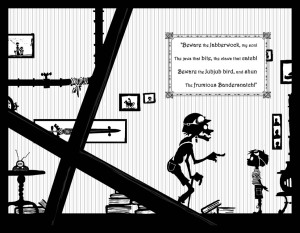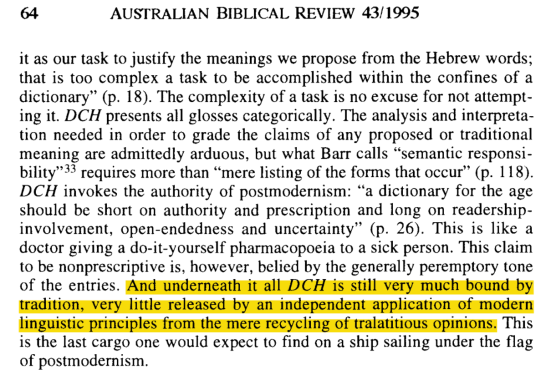Biblical scholars have always been in a difficult place. Trying to interpret the message of ancient people through ancient writings. So many disciplines must be incorporated and roles played to accomplish this task.
Grammarian.
Historian.
Literary critic.
Translator.
Anthropologist.
Theologian.
Textual critic.
Fill in the blank…
Eclecticism is the name of the game. And what a difficult game it is. To grapple responsibly with so many different disciplines, all the while determining the appropriate level of expertise or detail with which it is necessary to interact with the field can be an incredibly daunting task. And honestly, I think a good many biblical scholars do a da[r]n good job juggling a handful of these roles at the same time.
If this wasn’t hard enough, a new role has come on the scene over the past several decades: the Linguist. Now biblical scholars are faced with several choices: to entertain this guest, to walk-away or dive in.
But what a role this is.
You would think it’d be easy to be a linguist—we use language everyday, almost as an afterthought. But when confronted with questions like how can “tip” mean the compensation paid a server AND the pointy part of the end of an object, things might get hairy (or what about, how come I can say, “I need three pieces of wood” but not “I need three woods”?).
The fact of the matter is, language is complicated, and so is trying to understand how it works—which is the goal of linguistics. This field is a whole other discipline, removed as far as chemistry is from economics as it is from biblical studies.
Yet nonetheless, some biblical scholars forge ahead into this unknown territory.
The reasons may be numerous, but I’m sure one of the main contenders is the conviction that linguistics—in some form or another— can enhance their exegetical skills, allowing for a more attuned interpretation of the Bible. At least, that was me five years ago, and to an extent still is. But there is a danger with this approach, which is the same for any other cross-pollination of disciplines: the scholar is not fully invested in the discipline they’re trying to exploit. In short, it becomes too easy to wade in only as far as necessary to glean some insight before returning to the shoreline. But what has truly been gleaned? It’s too easy to think one is doing good linguistic work, when really, if a “real linguist” poked their head in, they may wrinkle their brows—or worse….
Does this mean biblical scholars should abandon linguistic endeavors? Μὴ γένοιτο! May it never be! There is much to learn from this field. A healthy workaround would be for biblical scholars to reach across the aisle to those outside their discipline and collaborate with other linguists. Just as there are pastors as scholars and scholars as pastors, there are linguists as biblical scholars and biblical scholars as linguists. My advice is to find the former and see what they have to say. Another alternative, of course, is to quit tinkering and dive in.[1] The waters are deep, but helpful introductions are surfacing more and more. (Hint: there’s 4 hyperlinks, not three).
If you haven’t guessed it already, this is where the “Beware the buzzwords, my son!” title comes in.
 In light of the preceding remarks—concerning the multifaceted demands of being a biblical scholar, compounded with a growing awareness and importance of the role of the linguist—I don’t want you to get the wrong idea when I say linguistics is a buzzword. I don’t mean it’s new, just that it’s hip.
In light of the preceding remarks—concerning the multifaceted demands of being a biblical scholar, compounded with a growing awareness and importance of the role of the linguist—I don’t want you to get the wrong idea when I say linguistics is a buzzword. I don’t mean it’s new, just that it’s hip.
People have been using this term for a long time, but more recently, if a handbook, commentary, grammar, or lexicon is to be hailed as bringing something new to the table, it must be one that is linguistically informed. And quite frankly, there’s nothing wrong with this. It actually excites me to see so much fascination with linguistic trends these days. The trouble, is that bona fide linguistics sometimes has no impact on the resource. I don’t mean the words on the page aren’t concerned with matters related to language—they are—but that they may not be informed by or representative of linguistics proper, the discipline. Let’s take a quick look at a recent example from an acclaimed lexicon.
Perhaps the most significant ancient Hebrew lexicon to surface in the recent past is Clines’ Dictionary of Classical Hebrew. Much of the hype (if I may call it that) stems from claims in the preface to be based on modern linguistic principles. However, in my opinion—and the opinions of quite a few others—these claims are far fetched.
Let me explain.
Part of the advances in modern linguistics is the powerful way it can deal with meaning, particularly with regard to how expressions—like words, constructions, even discourses—actually mean things. This in turn allows us to speak more intelligently about how meaning develops with an expression and changes over time in a motivated (not arbitrary) manner.
For biblical language lexica this means we’re able to do a lot more than record collocational patterns and provide target language glosses.[2] And some are doing more—but Clines’ lexicon takes a deliberate step in the other direction. Claiming to honor a postmodern paradigm, the lexicographers of the Dictionary of Classical Hebrew allow their linguistic muscles to atrophy as they place this burden on the reader to form their own semantic conclusions based on the data the lexicon collects and presents (which one could perhaps get for themselves using syntax/grammatical searches with a bible software application).
Unlike previous dictionaries, the Dictionary of Classical Hebrew has a theoretical base in modern linguistics… The theoretical base comes to expression primarily in the overriding concern… for the uses of words in the language… we subscribe to the dictum that the meaning of a word is its use in the language. The focus… is not so much on the meanings, or the translation equivalents, of individual words as on the patterns and the combinations in which words are used… the priority given to the most commonly attested sense, the avoidance of historical reconstructions, of the evidence of cognate languages, and the marking of certain usages as “figurative” or “metaphorical. (Clines 1993:15)
By design, then, this new dictionary systematically deflects attention from the word to the larger units of meaning… Its function is not primarily to tell the user the meaning of words. It has not been written in order to help readers of the Hebrew texts to discover how to translate those texts. It would indeed be a very inconvenient way of studying a Hebrew text to look up the meanings of all the words in this large and exhaustive work. Rather the primary function of this dictionary is to organize and rationalize the available data about Hebrew words, enabling readers to make their own decisions about the meaning of words in the light of all the evidence, which has been arranged in such a way as to make that task feasible… a dictionary for the age should be short on authority and prescription and long on reader involvement, open-endedness and uncertainty… so we have consistently regarded our task as providing and organizing the data that others will use as they think best, rather that imposing our own views as to what is significant. (Clines 1993:26)
In the end, we are left with much of the same when we consult the pages of the Dictionary of Classical Hebrew: English glosses and a comprehensive treatment of collocational arrangements.[3] I could go on about this, but a number of others already have. For now I’ll let one of them speak on my behalf.[4]
The take-away of this post is two-fold: 1) to wear the hat of a linguist is a relatively recent and difficult trend, 2) so have your wits about you when you hear this buzzword attached to a new biblical resource. Linguistics has much to offer the world of biblical studies, so try to find people who are trusted—as biblical scholar-linguists, not vice-versa—to do the vetting. And if you’re not sure who such people might be, check back in a couple days for some exciting news about a new series we’ll be launching on Old School Script to introduce you to a few such studs and stud-ettes.
***
[1] For some people, either breed may be hard to find; and probably even more so the linguists as biblical scholar. In the next couple weeks Old School Script will be hosting a new series in which we’ll interview up-and-coming / already-arrived scholars who are intent on informing their biblical studies with strong linguistic backing. Before the series gets going, I’ll give an official heads up post.
[2] And in case you’re wondering, Barr has gone to great length explaining the inadequacies of glosses. Despite the gut feeling of many that a gloss tells you what a word means, Barr contends that “these simple equivalents can hardly be dignified with the term ‘meanings’; […] they are not themselves meanings nor do they tell us the meanings; the meanings reside in the actual Hebrew usage” (J. Barr, “Hebrew Lexicography”, Studies on Semitic Lexicography (ed. P. Fronzaroli) (Quaderni di Semitistica 2; Firenze 1973) 120. Atkins and Rundell, two modern day esteemed lexicographers, are even more explicit: “meanings and dictionary senses aren’t the same thing at all. Meanings exist in infinite numbers of discrete communicative events, while the senses in a dictionary represent lexicographers’ attempts to impose some order on this babel” (B. Atkins – M. Rundell, The Oxford Guide to Practical Lexicography [Oxford 2008], Oxford, 311).
[3] Clines admits this approach may leave some users disenchanted, and so admits: “This dictionary marks an important departure from the tradition of Hebrew lexicography, and it is our hope that it will be judged according to its own stated designs and not according to the norms with which scholars have long been familiar” (Clines 1993:7). But how does this approach represent a lexicon that takes advantage of modern linguistic theory in any substantive or worthwhile manner?
[4] F.I. Andersen, “Review Article and Responses: The Dictionary of Classical Hebrew. Vol. 1 א”, Australian Biblical Review 43 (1995), 65. For additional critical appraisals of this lexicon, see J.C. Lübbe, “Methodological Implications in the Early Signs of a New Dictionary of Classical Hebrew” Zeitschrift für Althebraistik 4 (1991), 135-143; T. Muraoka, “A New Dictionary of Classical Hebrew”, Abe-Nahrain Supplement 4 (1995), 87-101; Van der Merwe, “Towards a Principled Model for Biblical Hebrew Lexicology”, JSNL 30/1 (2004) 119-137, especially 121-126; id., “Lexical Meaning in Biblical Hebrew and Cognitive Semantics: A Case Study”, Biblica 87/2 (2006a) 85-9, especially 56; Imbayarwo, “A Biblical Hebrew Lexicon for Translators Based on Recent Developments in Theoretical Lexicography”, Unpublished M.A. thesis, University of Stellenbosch (2008), 14-16, 109-14.
PS: apologies for using the same picture from a long time ago; couldn’t find a better one



Reblogged this on Talmidimblogging.
Interesting post! Perhaps you will comment sometime on the Semantic Domain Dictionary of Biblical Hebrew (de Blois).
Better yet, maybe I’ll just see if deBlois wants to talk about himself on OSS. Thanks for the idea!
Pingback: Old School Script and Linguistics | ἐνθύμησις
Pingback: The Biblical Scholar-Linguist: An Ostrich among Robins | Old School Script
Pingback: No other god besides Jehovah who gives all explanation – Messiah For All